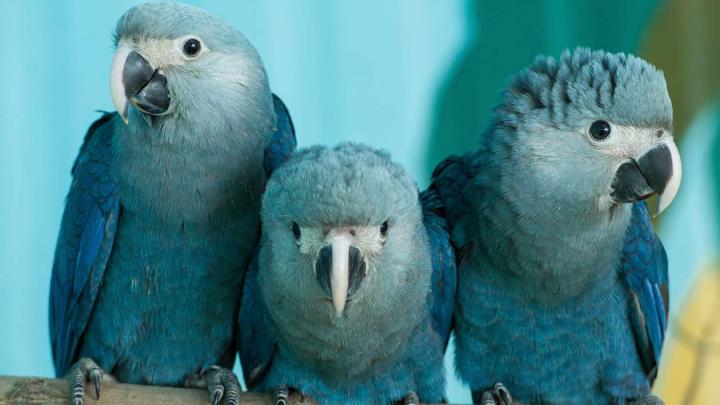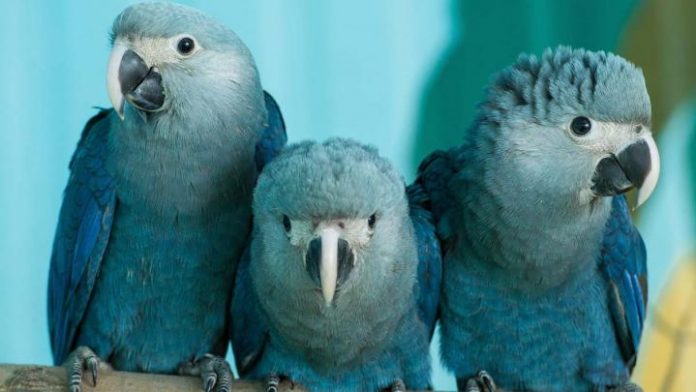
Photo: In September 2018, researchers declared that the Spix’s macaw was extinct in the wild.
view more
Credit Image: Association for the Conservation of Threatened Parrots (ACTP)
Scientists urge that a clear, unambiguous goal for preventing human-induced species extinctions and stabilising populations must be front and centre in the Post-2020 Global Biodiversity Framework – currently formulated draft iterations carry a serious risk of failure.
Next year, governments of the world will come together to adopt the Post-2020 Global Biodiversity Framework under the United Nations’ Convention on Biological Diversity (CBD). Much like the Paris Agreement with its clear statement on limiting carbon emissions, this framework will establish a set of goals and targets for conserving the diversity of life on Earth.
However, University of Queensland (UQ) scientists along with a team of international collaborators from Birdlife International, the International Union for Conservation of Nature (IUCN), and Newcastle University (among others) warn that early drafts of this framework do not go far enough to trigger the actions needed to address the alarming decline of species around the world.
Worryingly, the way the draft goal for conserving species has been worded, it could be achieved by allowing some species to go extinct.
“The evidence is very clear. We are facing a global extinction crisis, and what nations put in the Post-2020 Global Biodiversity Framework is a line in the sand moment,” said Professor James Watson from UQ and the Wildlife Conservation Society.
“Quite simply, the framework, and nations that sign up to it, must make an unambiguous commitment to preventing all future human-driven species extinctions. As it stands currently, the goal being put forward is a backwards step from what countries committed to achieving in 2010.”
UQ PhD student Brooke Williams, who led a new study examining the key elements of a goal for conserving species post-2020, said that a robust goal for species requires several key ingredients.
“We propose a revised wording for a species-focused goal in the Post-2020 Global Biodiversity Framework that is ambitious, unambiguous, can be readily communicated and comprises quantifiable elements against which nations can easily measure their progress. Crucially, the goal we propose in our new study strips away the potential for perverse outcomes, like species being allowed to go extinct or become more threatened. In early drafts, both of these outcomes could eventuate, and be entirely consistent with the goal for species being achieved – clearly, this is an unsatisfactory response to the global biodiversity crisis.”
UQ’s Dr Jeremy Simmonds said that there are encouraging signs in the language of the Post-2020 Global Biodiversity Framework.
“Increasing attention on recovering populations of species – even those that are not at risk of extinction – is a step in the right direction. We know that ‘common’ species are vital for ecosystem function, and having them accounted for in a holistic goal for species post-2020 is of vital importance. The revised goal that our study puts forward builds upon the language of earlier drafts, which appropriately captured this often neglected element of conservation – protecting non-threatened species.”
BirdLife International’s Dr Stuart Butchart, who collaborated on the study, highlights that stopping species declines, and ultimately recovering populations, is not an insurmountable challenge.
“A substantial body of evidence reveals that conservation actions, when well-planned, adequately resourced and effectively implemented, can stop species from going extinct, slow the rate at which species are driven toward extinction, and halt and reverse population declines, emphasising the feasibility of meeting an ambitious goal for species if we can get the wording right,” said Dr Butchart.
“We have the means to stop extinctions, and now we need the political will and resources.”
###
The Post-2020 Global Biodiversity Framework is a stepping-stone towards achieving the CBD’s 2050 Vision of ‘Living in harmony with nature’. It will replace the Strategic Plan for Biodiversity 2011-2020, which failed demonstrably to prevent declines in species populations and human-induced species extinctions.
Citation: Williams BA, Watson JE, Butchart SHM, Ward M, Brooks TM, Butt N, Bolam FC, Stuart SN, Mair L, McGowan PJK, Gregory R, Hilton-Taylor C, Mallon D, Harrison I, Simmonds JS. 2020. A robust goal is needed for species in the Post-2020 Global Biodiversity Framework. Conservation Letters. e12778.
https:/
TDnews (tunisiesoir.com)















